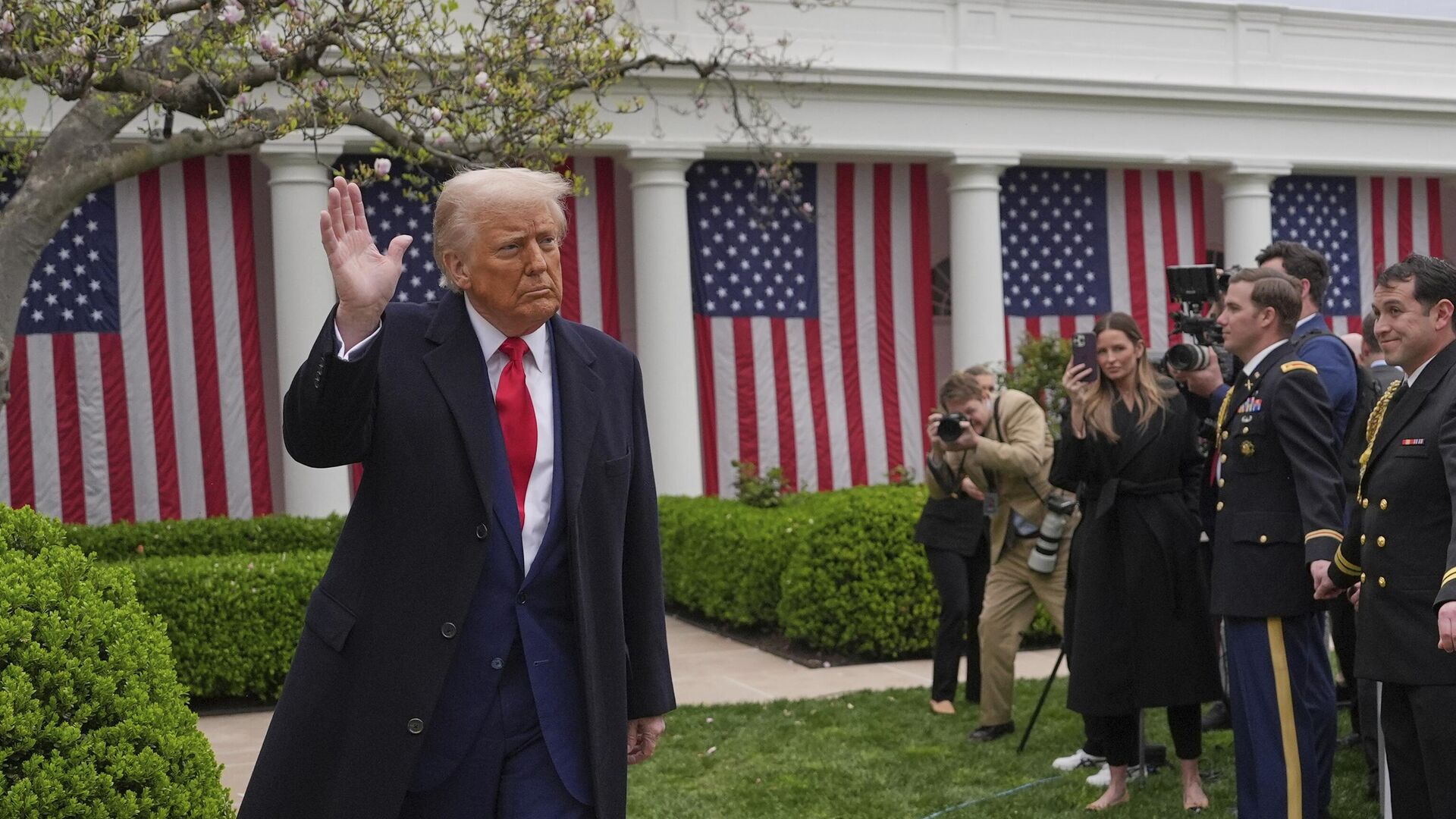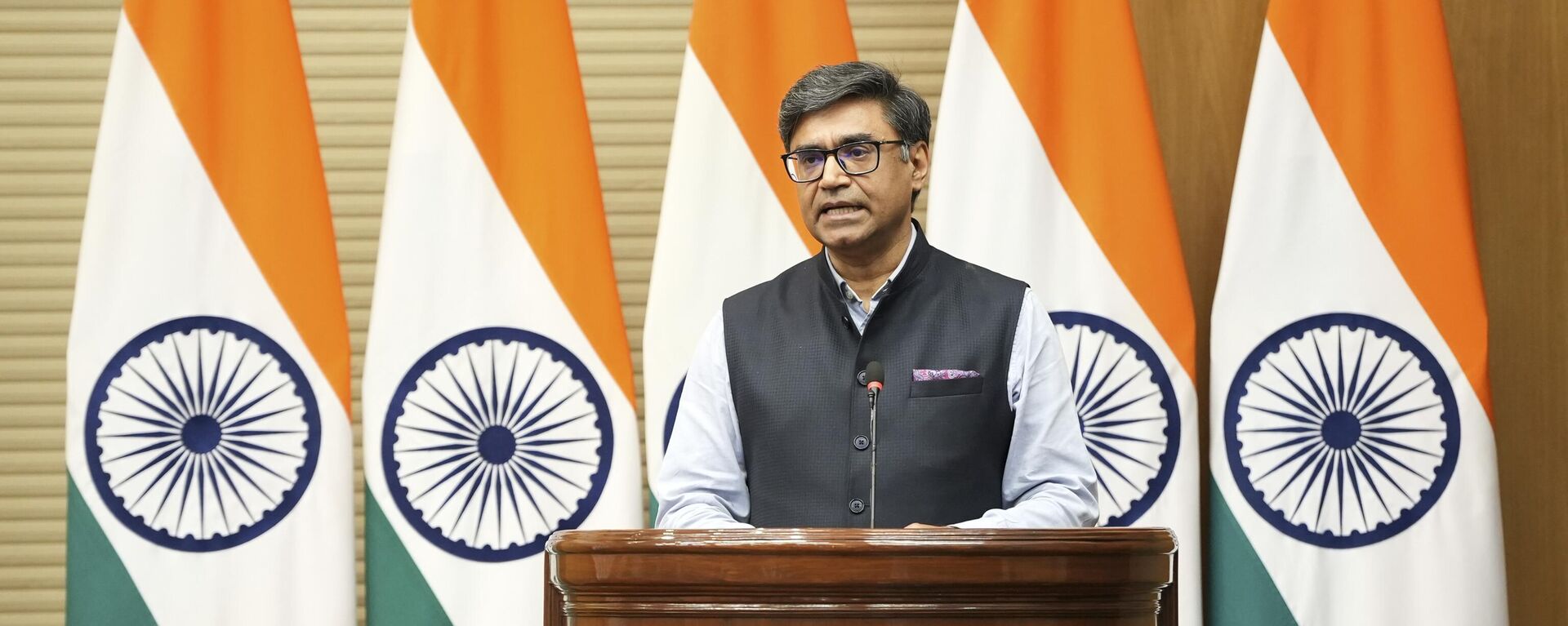https://sputniknews.in/20250511/india-rejects-us-attempt-to-hog-credit-for-de-escalation-with-pakistan-9104927.html
India Rejects US Attempt to Hog Credit for De-escalation with Pakistan
India Rejects US Attempt to Hog Credit for De-escalation with Pakistan
Sputnik India
India has pushed back against the Trump administration's attempt to take credit for the "ceasefire" reached between the two countries on Saturday
2025-05-11T12:53+0530
2025-05-11T12:53+0530
2025-05-11T12:53+0530
donald trump
indira gandhi
narendra modi
pakistan
india
us
ministry of external affairs (mea)
indian air force (iaf)
terror charges
pahalgam terror attack
https://cdn1.img.sputniknews.in/img/07e9/04/0b/8972221_0:0:3072:1728_1920x0_80_0_0_f64d257ab95a17858ccd3dbfd7afdad0.jpg
India has pushed back against the Trump administration's attempt to take credit for the "ceasefire" reached between the two countries on Saturday, after over two days of hostilities following Indian precision strikes against Pakistan-based terrorist infrastructure on 7 May.The Indian strikes, codenamed 'Operation Sindoor', were in response to the Pahalgam terrorist attack on 22 April, which New Delhi has described as the "original escalation".In a way, these statements contradict the statements of US President Donald Trump and Secretary of State Marco Rubio.Even before the official announcements from either India or Pakistan on the agreement to de-escalate, Trump took to social media on Saturday to state that the US "mediated" the talks between India and Pakistan. Rubio posted on X that Vice-President JD Vance and himself engaged with Prime Minister Narendra Modi, External Affairs Minister (EAM) S Jaishankar and National Security Advisor Ajit Doval over the previous 48 hours. Rubio also said that the Trump administration had also held parallel talks with Pakistan Prime Minister Shehbaz Sharif, National Security Advisor (NSA) Asim Malik and Chief of Army Staff (COAS) Asim Munir. Rubio claimed that not only did India and Pakistan agree to de-escalate tensions, but also agreed to "start talks on a broad set of issues at a neutral site".In a post on X, Sharif thanked Pakistan "for his leadership and proactive role for peace in the region.""Pakistan appreciates the United States for facilitating this outcome, which we have accepted in the interest of regional peace and stability,” Sharif said, also expressing his appreciation for efforts by Vance and Rubio.Significantly, Sharif also expressed hope that the de-escalation would mark a "new beginning in the resolution of issues" in the South Asian region. Sharif's statements are in consonance with those of the Trump administration.Meanwhile, Foreign Secretary Vikram Misri, while announcing the de-escalation minutes after Trump's statement on Saturday, told a special briefing at the Ministry of External Affairs (MEA) headquarters that the Director General of Military Operations (DGMO) of Pakistan had called the Indian DGMO at 1535 hours IST, following which both the sides decided to deescalate the situation.Misri said that both the DGMOs would speak again on 12 May (Monday) to review the situation. In a short post on X announcing the de-escalation development, EAM Jaishankar said that India would continue to maintain an "uncompromising" stance against terrorism. At the same time, sources said that any future act of terrorism would be treated as an "act of war" by India.EAM Jaishankar has said on previous occassions that the only issue waiting to be resolved vis-a-vis Jammu and Kashmir is the vacation of "illegally occupied territory by Pakistan". Congress spokesperson Supriya Shrinate posted an image of former Prime Minister Indira Gandhi on Saturday, with a caption-- "It's not easy to be Indira Gandhi", while referring to the 1971 Bangladesh Liberation War, when the former PM had rebuked Washington's pressure tactics.Singh also revealed that Indian strikes had also targeted radar sites at Pasrur and the Sialkot aviation base. Significantly, the Nur Khan base (Chaklala) in Rawalpindi serves as the headquarter of Pakistan's Air Mobility Command, according to reports in Indian media. The Rafiqui base is home to PAF's squadrons of JF-17 and Mirage. The Murid base is where Pakistan's drone operations are coordinated from.
https://sputniknews.in/20250510/india-pakistan-agree-on-immediate-ceasefire-9103645.html
pakistan
india
us
kashmir valley
jammu and kashmir (j&k)
Sputnik India
feedback.hindi@sputniknews.com
+74956456601
MIA „Rossiya Segodnya“
2025
Dhairya Maheshwari
https://cdn1.img.sputniknews.in/img/07e6/0c/13/138962_0:0:641:640_100x100_80_0_0_2cb44360dbcdf6d84bf4b299cd045917.jpg
Dhairya Maheshwari
https://cdn1.img.sputniknews.in/img/07e6/0c/13/138962_0:0:641:640_100x100_80_0_0_2cb44360dbcdf6d84bf4b299cd045917.jpg
News
en_IN
Sputnik India
feedback.hindi@sputniknews.com
+74956456601
MIA „Rossiya Segodnya“
Sputnik India
feedback.hindi@sputniknews.com
+74956456601
MIA „Rossiya Segodnya“
Dhairya Maheshwari
https://cdn1.img.sputniknews.in/img/07e6/0c/13/138962_0:0:641:640_100x100_80_0_0_2cb44360dbcdf6d84bf4b299cd045917.jpg
pakistan news, pakistan violates ceasefire, trump news, trump modi, trump pakistan, trump kashmir, trump deescalation, india pakistan deescalation, indian strikes at paf bases, operation sindoor, india pakistan war, india pakistan latest updates, pakistan drone attack
pakistan news, pakistan violates ceasefire, trump news, trump modi, trump pakistan, trump kashmir, trump deescalation, india pakistan deescalation, indian strikes at paf bases, operation sindoor, india pakistan war, india pakistan latest updates, pakistan drone attack
India Rejects US Attempt to Hog Credit for De-escalation with Pakistan
India has subtly rejected President Donald Trump's statement claiming that the US "mediated" the de-escalation talks between India and Pakistan, suggesting that there was no third-party mediation on the issue.
India has pushed back against the Trump administration's attempt to take credit for the "ceasefire" reached between the two countries on Saturday, after over two days of hostilities following Indian precision strikes against Pakistan-based terrorist infrastructure on 7 May.
The
Indian strikes, codenamed 'Operation Sindoor', were in response to the
Pahalgam terrorist attack on 22 April, which New Delhi has described as the "original escalation".
A government source told Sputnik India that the stoppage of military action between India and Pakistan had been worked out "directly" between the two countries.
Further, the source clarified that there is "no decision" to hold any talks with Pakistan on any other issue at any other place whatsoever.
In a way, these statements contradict the statements of US President Donald Trump and Secretary of State Marco Rubio.
Even before the official announcements from either India or Pakistan on the agreement to de-escalate, Trump took to social media on Saturday to state that the US "mediated" the talks between India and Pakistan.
Rubio posted on X that Vice-President JD Vance and himself engaged with Prime Minister Narendra Modi, External Affairs Minister (EAM) S Jaishankar and National Security Advisor Ajit Doval over the previous 48 hours. Rubio also said that the Trump administration had also held parallel talks with Pakistan Prime Minister Shehbaz Sharif, National Security Advisor (NSA) Asim Malik and Chief of Army Staff (COAS) Asim Munir.
Rubio claimed that not only did India and Pakistan agree to de-escalate tensions, but also agreed to "start talks on a broad set of issues at a neutral site".
In another post on Truth Social on Sunday, Trump said that he would work with both New Delhi and Islamabad to help broker a "solution" on the Kashmir dispute.
In a post on X, Sharif thanked Pakistan "for his leadership and proactive role for peace in the region."
"Pakistan appreciates the United States for facilitating this outcome, which we have accepted in the interest of regional peace and stability,” Sharif said, also expressing his appreciation for efforts by Vance and Rubio.
Significantly, Sharif also expressed hope that the de-escalation would mark a "new beginning in the resolution of issues" in the South Asian region. Sharif's statements are in consonance with those of the Trump administration.
Meanwhile,
Foreign Secretary Vikram Misri, while announcing the de-escalation minutes after Trump's statement on Saturday, told a special briefing at the Ministry of External Affairs (MEA) headquarters that the Director General of Military Operations (DGMO) of Pakistan had called the Indian DGMO at 1535 hours IST, following which both the sides decided to
deescalate the situation.
Misri said that both the DGMOs would speak again on 12 May (Monday) to review the situation. In a short post on X announcing the de-escalation development, EAM Jaishankar said that India would continue to maintain an
"uncompromising" stance against terrorism. At the same time, sources said that any future act of terrorism would be treated as an "act of war" by India.
In addition to India stating that it won't hold any talks with Pakistan on any issue whatsoever, New Delhi's stance on Jammu and Kashmir has been clear and consistent. Successive Indian administrations have stated that Jammu and Kashmir remains a bilateral issue between the two neighbours, despite Pakistan's efforts to internationalise the issue.
EAM Jaishankar has said on previous occassions that the only issue waiting to be resolved vis-a-vis Jammu and Kashmir is the vacation of "illegally occupied territory by Pakistan".
These statements from the Trump administration haven't gone down well in India's political establishment as well as in the strategic community. A politician from the Congress Party accused the government of "succumbing to American pressure".
Congress spokesperson Supriya Shrinate posted an image of former Prime Minister Indira Gandhi on Saturday, with a caption-- "It's not easy to be Indira Gandhi", while referring to the 1971 Bangladesh Liberation War, when the former PM had rebuked Washington's pressure tactics.
Meanwhile, in India, there is a clear sense that Pakistan was forced to seek a negotiated settlement after India launched "precision strikes" from air at key Pakistan Air Force (PAF) bases- Rafiqui, Murid, Chaklala, Rahim Yar Khan, Sukkur and Chunian- as announced by Indian Air Force (IAF) Wing Commander Vyomika Singh at a special briefing on Saturday.
Singh also revealed that Indian strikes had also targeted radar sites at Pasrur and the Sialkot aviation base.
Significantly, the Nur Khan base (Chaklala) in Rawalpindi serves as the headquarter of Pakistan's Air Mobility Command, according to reports in Indian media. The Rafiqui base is home to PAF's squadrons of JF-17 and Mirage. The Murid base is where Pakistan's drone operations are coordinated from.



